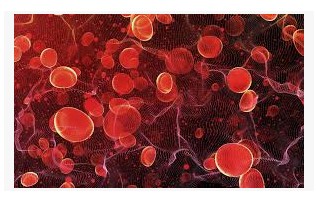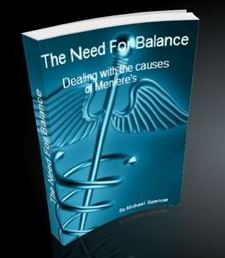Hypoglycemia and Meniere’s disease
Posted Under: General Information on Meniere's Disease / Syndrome,Meniere's Disease and Nutrition,Meniere's Disease Triggers & Causes
By Mike Spencer
Founder of Meniere’s Help – Supporting Sufferers Since 2004
Researcher and author of Managing Meniere’s Disease and The Need for Balance – Dealing with the Causes of Meniere’s
Table of Contents
Hypoglycemia and Meniere’s disease

The links between Meniere’s disease and hypoglycemia have been studied for decades.
Hypoglycemia as a cause of Meniere’s is debatable in that there are several possible root causes and many contributing factors to consider. Whether it is a root cause or not, it seems evident that there is a link in a significant number of cases. Bear in mind that what is relevant in one person who has the symptoms of Meniere’s might not be relevant in another.
There can be very different root causes that all have the same resulting symptoms that come under the label of “Meniere’s”.
The blood sugar and insulin factors in Meniere’s is something that should not be ignored and is worth investigating for the sufferer. By doing so, you can either rule out the relevance in your case or if it is relevant to you, understand what action you can take to help your body find balance.
Here the focus is mainly on non diabetic hypoglycemia, seizures and Meniere’s disease. Many sufferers report they have had a history at some point in their lives of experiencing hypoglycemic type symptoms and/or seizures.
ENT doctors may dismiss any connections with this and the symptoms of Meniere’s. However, research would suggest there is indeed a connection in a sizeable enough number of sufferers.
Moreover the connections are there to see in plenty of cited studies to back this up.
Insulin and blood sugar levels are relevant in Meniere’s disease. One hypothesis regarding Meniere’s is that when the pressure becomes too intense the endolymphatic sac bursts and two electrolytes, potassium and sodium that should be kept apart are mixed, causing vertigo.
This hypothesis may or may not be correct, however, it is a known fact that excess sodium retains fluid in the tissues. Excess fluid can manifest into the key factor in Meniere’s and almost all disease states and that key factor is inflammation.
Moreover, consuming too much sugar can be a very fast reacting trigger for increased pressure, tinnitus, dizziness or vertigo in some Meniere’s sufferers.
Where insulin may come into the picture is that insulin is very much part of the regulation of sodium and potassium within the kidneys. Studies on diabetes show that insulin plays a part in sodium retention.
Click here to read about Diabetes and Meniere’s disease
What is hypoglycemia?
Hypoglycemia is a condition caused by low blood glucose (blood sugar) levels. Glucose is the main source of energy for the body. The condition is most common in people with diabetes who have issues with medicine, food, or exercise.
According to the center for advance medicine, Hypoglycemia, or low blood sugar, is caused by an inconsistent oversupply of insulin or an under-supply of adrenaline, especially if you have been eating a diet high in sugar.
Sometimes people who don’t have diabetes can also get low blood glucose. There are two kinds of nondiabetic hypoglycemia:
- Reactive hypoglycemia, which happens a few hours after you eat a meal
- Fasting hypoglycemia, which might be linked to medicine or a disease. Fasting hypoglycemia often happens after the person goes without food for 8 hours or longer.
The symptoms of hypoglycemia are:
- Hunger
- Shaking
- Anxiety
- Sweating
- Pale skin
- Fast or irregular heartbeat
- Feeling drowsy
- Dizziness
- Moodiness
In extreme cases it can cause: confusion, blurred vision and seizures.
Non-diabetic hypoglycemia is believed to be rare. Glucose (sugar) is the main source of energy for your body and brain. It comes from what we eat and drink.
Insulin, is a hormone that helps keep blood glucose at normal levels. Insulin’s job is to help glucose enter your cells where it’s used for energy. If your glucose level is too low, problems can occur.
What causes non-diabetic hypoglycemia?
In reactive hypoglycemia it is thought that being in a pre-diabetic state, someone who is considered at risk of diabetes, a result of stomach surgery and rare enzyme deficiencies can all be causes.
Causes of fasting hypoglycemia can include:
- Medicines, such as salicylates (a type of pain reliever), sulfa drugs (an antibiotic), pentamidine (to treat a serious kind of pneumonia), quinine (to treat malaria).
- Alcohol, especially with binge drinking.
- Serious illnesses, such as those affecting the liver, heart, or kidneys.
- Low levels of certain hormones, such as cortisol, growth hormone, glucagon, or epinephrine.
- Tumors, such as a tumor in the pancreas that makes insulin or a tumor that makes a similar hormone called IGF-II
Source: The Journal of Clinical Endocrinology & Metabolism
There are a number of causes of hypoglycemia other than eating too much sugar and overstimulating the pancreas:
- Fungus can contribute to hypoglycemia, or low blood sugar, by taking sugar that is needed by your cells.
- As mentioned, there is a connection with adrenal health. Stress hormones can trigger the body’s tendency to release too much insulin.
- Caffeine stimulates the sympathetic nervous system, which can lead to increased insulin levels.
- Hypoglycemia is often associated with food allergies.
- Nutritional deficiencies
Source: The Center for Advanced Medicine.
The linked causes above can also be very relevant to Meniere’s disease. Click the links to read their relevance to the symptoms of dizziness, vertigo, hearing loss and tinnitus in a separate window.
Eating small regular meals throughout the day may be advised for people with fasting hypoglycemia. This type of dietary advice has also been shown to help some sufferers of Meniere’s disease.
Other dietary advice can include, eating a variety of foods, including protein (meat and nonmeat), dairy foods, and high-fiber foods such as whole-grain bread, fruit, and vegetables as well as limiting high sugar foods.
Some doctors recommend a high-protein, low-carbohydrate diet. That said, according to the The Journal of Clinical Endocrinology & Metabolism this type of diet has not proven to help hypoglycemia.
However, we know all too well from our experience with Meniere’s, that even though something is not clinically proven, it doesn’t mean it cannot help.
Clinical links to hypoglycemia and Meniere’s disease
A 2015 study published in the International Archives of Otorhinolaryngology found that: “Auditory and vestibular symptoms usually occur prior to other manifestations of metabolic changes, leading to an early diagnosis of hyperinsulinemia, intestinal sugar malabsorption or diabetes.
Previously undiagnosed diabetes mellitus type II was found in 39 patients“*
* This was a retrospective study of 376 patients with inner ear symptoms suggestive of disturbances of carbohydrate metabolism.
A 2009 study published in the Brazilian Journal of Otorhinolaryngology concluded that: “87.7% of the patients with dizziness and suspicion of peripheral vestibular disorder had glucose or insulin metabolism disorders.”
Their results showed the following:
- Hypoglycemia was seen in 61.7% of the cases
- hyperinsulinemia in 55.5%
- hyperglycemia in 27.2%
- glucose intolerance in 12.3%
- hypoinsulinemia in 1.2%
- Normal tests were seen in 12.3 % of the cases and altered fasting glucose in 23.5%
These results clearly suggest that irregularities in both glucose metabolism and insulin production can play a major role in vestibular disorders such as Meniere’s.
The British Medical journal published a study in 2019 that concluded, “The organ of Corti could be a target tissue for insulin action, and inner ear insulin resistance might contribute to the association between diabetes and inner ear dysfunction.”
The organ of corti is a structure in the cochlea of the inner ear which produces nerve impulses in response to sound vibrations.
The International Tinnitus Journal published a study in 2005: Glucose and Insulin Profiles and Their Correlations in Meniere’s Disease.
Their results showed, ” insulin curves for approximately 71.87% of the patients (n = 46) with Meniere’s disease revealed hyperinsulinemia, whereas GTT results compatible with impaired glucose tolerance were found for only 6.25% (4 patients), and changes in fasting glycemia or GTT (or both) suggesting NIDDM were seen for only 4.69% (3 patients).”
Hyperinsulinemic hypoglycemia describes the condition and effects of low blood glucose caused by excessive insulin.
In the study Etiology and Treatment of FluidRetention (Hydrops)in Meniere’s Syndrome [Conrad A. Proctor, MD, Todd B. Proctor, M, Bruce Proctor, MD] it states:
“There is now much evidence that the hormone insulin promotes retention of sodium by the kidney . The end result of prolonged hyperinsulinemia also includes vasoconstriction and eventually arterial smooth muscle hypertrophy. Insulin production is stimulated by high-carbohydrate diets.
In this study, 58 of 75 Meniere’s patient s (seventy-seven percent) demonstrated abnormal insulin levels.
These patients were treated from 1980 to 1990 with a low carbohydrate, 6 to 8 feeding diet in addition to the usual no added -salt diet. Cholesterol was limited when indicated.
Ninety-one percent of these Meniere’s patients with abnormal insulin levels reported at least a ninety percent improvement in both severity and frequency of vertigo attacks for the entire ten year period.”
Seizures have been associated with hypoglycemia but a 2015 study published in Science Direct suggested, “In this study of a large number of patients with hypoglycemia, a notably low frequency of seizures was noticed. This indicates that the risk of seizures in association with low blood glucose levels seems to be low.“
In the book, The Need for Balance – Dealing with the Causes of Meniere’s, I explain the domino effect within our body that can eventually manifest the symptoms of Meniere’s disease. Seemingly unrelated health issues or injuries suffered sometimes years before can eventually result in Meniere’s.
Is there a possibility that someone who has experienced seizures, low blood sugar episodes, insulin irregularities or hypoglycemia at some point in their life becomes more susceptible to the symptoms of Meniere’s manifesting.
I recently posted this question in several Meniere’s related social media groups; “Did anyone experience any kind of seizures or hypoglycemia anytime in your life BEFORE your Meniere’s symptoms started?”
Of the 210 responses received, 90 said yes to hypoglycemia or low blood sugar. 26 said yes to some type of seizures.
As with all suspected root causes and secondary causes of Meniere’s symptoms the numbers are not conclusive but significantly high enough to suggest a correlation in some sufferers.
What to do about Hypoglycemia and Meniere’s disease?
There are several possible root causes of Meniere’s disease and many contributing factors. As stated at the beginning of this article, what is relevant for one sufferer may have little to no relevance in another. You may have more than one root problem contributing to your symptoms.
Almost certainly, all of them result in inflammation.
You can deal with inflammation by eating foods high in anti-inflammatory nutrients, avoiding foods that cause inflammation and avoiding foods high in sodium.
You can support your immune system with nutrient rich foods, high in anti-oxidants and using quality dietary supplements.
Control of hypoglycemia is almost exclusively dietary. Although hypoglycemia is in some ways the opposite of diabetes, the dietary recommendations are essentially the same since in both cases the goal is to stabilize insulin and sugar levels.
According to the center for advanced medicine, you should eat complex carbohydrates and fiber along with protein, and avoid sweets and refined foods. Frequent small, high protein meals help modulate insulin swings and control hypoglycemia
Magnesium
Magnesium is one of the most significant mineral nutrients for the body to function and deficiency may be common among the general population. You can read more about its importance for Meniere’s sufferers here: Magnesium links to Meniere’s disease
Regarding hypoglycemia, low blood sugar and insulin, magnesium plays an important role in helping your body convert glucose from your food into fuel. If you don’t have enough magnesium in your body, your cells can become less effective at using insulin.
A 2013 study at the Medical School of Yangzhou University, China, concluded that “Increasing dietary magnesium to meet the RDA has a protective effect on insulin resistance.”
A 1982 study at Brigham Young University ‘Reactive hypoglycemia and magnesium’ states that, “Mg [Magnesium]supplementation appeared to prevent nadirs in plasma glucose that were significantly below fasting levels. This suggested that the hypoglycemia of reactive hypoglycemia would be a sign of a complex disorder and not the cause.
It is suggested that reactive hypoglycemia is related to a disturbed Mg balance. Mg-Ca [Magnesium – Calcium] interactions also appear to be important but the mechanisms are not clear.
Subjective complaints, such as fatigue, and the disturbed blood sugar control would be symptoms and signs of this syndrome.”
A 1994 study published in the French journal, Therapie states, “The interrelationships between magnesium and carbohydrate metabolism have regained considerable interest over the last few years. Insulin secretion requires magnesium: magnesium deficiency results in impaired insulin secretion while magnesium replacement restores insulin secretion.”
Nature.com published a study in 2016 ‘Mg supplementation appears to have a beneficial role and improves glucose parameters in people with diabetes and also improves insulin-sensitivity parameters in those at high risk of diabetes.’
There are many factors to consider regarding dietary magnesium and it would be worth clicking the link above ‘Magnesium links to Meniere’s disease‘ to learn more.
Green leafy vegetables such as spinach, nuts, brown rice, dairy products and wholegrain foods are good sources of magnesium. The super food, Moringa is one of the best sources of dietary magnesium.
Calcium
Calcium works in synergy with magnesium, too much or too little of one can have an effect on how the other works inside the body.
Calcium is not just about healthy bones and teeth, it is essential for life. A 1981 study in Hormone and metabolic research, ‘Effect of calcium infusion on post-reactive hypoglycemia’ found that: “In normal subjects, this infusion did not affect insulin secretion and OGTT, contrary to all patients with reactive hypoglycemia in whom calcium infusion produced significant increase in plasma glucose. Simultaneously the symptoms of hypoglycemia disappeared. Continuous infusion of calcium suppressed reactive hypoglycemia.”
Dietary sources of calcium include: diary products, green leafy vegetables, soybeans, the bones in sardines and fortified cereals.
Chromium
Chromium is an essential trace mineral that can improve insulin sensitivity and enhance protein, carbohydrate, and lipid metabolism. It is a metallic element that people need very small quantities of. Processing foods such as polishing rice can rob the cereal of its chromium, increasing the possibility of blood sugar irregularities.
In a 1987 clinical trial published on pubmed, ‘Effects of supplemental chromium on patients with symptoms of reactive hypoglycemia’ it was found that: “Chromium supplementation alleviated the hypoglycemic symptoms and significantly raised the minimum serum glucose values observed two to four hours following a glucose load.
Insulin binding to red blood cells and insulin receptor number also improved significantly during Cr supplementation. These data suggest that impaired Cr nutrition and/or metabolism may be a factor in the etiology of hypoglycemia.”
*According to the US National Institute of Health, “The FNB has not evaluated chromium since 2001. However, in 2014, the European Food Safety Authority Panel on Dietetic Products, Nutrition and Allergies concluded that no convincing evidence shows that chromium is an essential nutrient and, therefore, setting chromium intake recommendations would be inappropriate.”
Eating a fully balanced diet of fresh (organic where possible) produce and avoiding processed and fast food is a wise choice for anyone, but for people suffering with Meniere’s disease and compromised by hypoglycemia it would seem particularly prudent.
We know from the experience of supporting sufferers since 2004, that a healthy diet, lifestyle and using high quality full spectrum supplementation can help a great deal in either reducing or even eliminating the symptoms of Meniere’s.
Click here to read about supplements for Meniere’s
Spirulina
Spirulina is nutrient packed superfood that may have many possible benefits for Meniere’s sufferers (read more here). Spirulina also has value for those suffering from hypoglycemia.
The Journal of medicinal food published a study in 2001. Extract:
“Spirulina, with its high concentration of functional nutrients, is emerging as an important therapeutic food. This study aimed to evaluate the hypoglycemic and hypolipidemic role of Spirulina. Twenty-five subjects with type 2 diabetes mellitus were randomly assigned to receive Spirulina (study group) or to form the control group.
These findings suggest the beneficial effect of Spirulina supplementation in controlling blood glucose levels and in improving the lipid profile of subjects with type 2 diabetes mellitus.”
If you found this article useful Click here to support Meniere’s Help paypal.me/menieres
Related articles:
For more information related to hypoglycemia and Meniere’s disease read also: Diabetes and Meniere’s Disease
Help other sufferers. What is your experience with Meniere’s and hypoglycemia or low blood sugar levels? Tell us all about it in the comments box below or email Mike at meniereshelp@gmail.com. Your input and perspective is always appreciated.
References/further reading: Hypoglycemia in Meniere’s Disease






